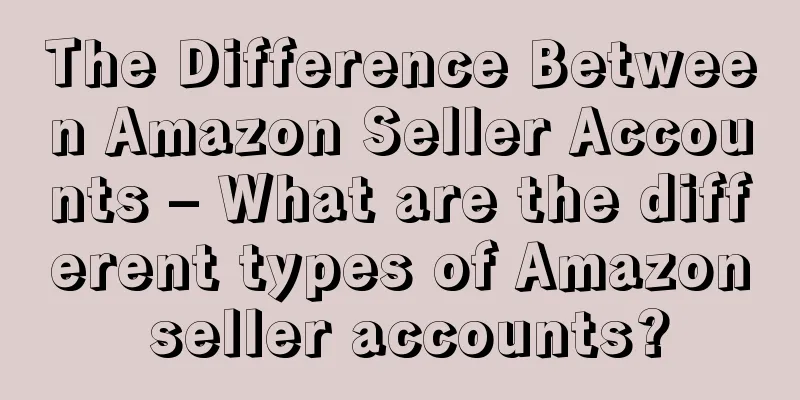Amazon sellers are mainly divided into individual sellers and professional sellers. If you want to become a professional seller, there is no distinction between companies and individuals. Everyone can open one. However, last year, corporate certification was required, which means that everything became stricter. Subsequently, Amazon launched two categories, VE and business. Simply put, VE means that you are a certified supplier of Amazon. Generally, only American corporate sellers are allowed to open it. Business is equivalent to wholesale, and it wants to share a piece of the pie with Alibaba. See below for details.
1. What are the differences between Vendor, Vendor Express, Seller, and Business?
A Vendor account is when Amazon is interested in your products and proactively contacts you to invite you to sell your products to them on consignment. In other words, if you sell your products yourself as a Seller, then Amazon will help you promote your products as a Vendor. At the same time, all products in the account will be automatically included in the Amazon Business mall.
Vendor Express (so-called VE accounts) is a voluntary participation by third-party sellers.
Seller accounts are called third-party sellers by Amazon, and accounts operated by third-party sellers are Seller accounts. Now basically all the main accounts operated by Chinese sellers are Seller accounts.
A Business account is a seller account opened for commercial purchases, referred to as ABS (Amazon Business Seller). Business accounts are still operated by the sellers themselves, but the buyers they target are all Amazon business buyers, and most orders are small-scale bulk purchases.
5 major features of Business seller account
Bulk Discounts*
Specify that the product is released only in the Business market
Large-volume commission discounts*
Tax relief
A+ Content*
Seller Advantages*
Download product manual*
Business Account Statement*
2. How to apply for Business, Vendor, Vendor Express, Seller?
Business account: New sellers must first submit an application to Amazon; Sellers can directly apply to open a Business account.
Vendor accounts are invitation-based, so you don’t have much initiative
It is entirely possible to apply for Vendor Express. Required information (registered U.S. company, federal tax number, U.S. bank account number, and a local U.S. address that can receive and send mail on a long-term basis).
Special reminder:
a. After opening an account, you will soon receive a sample order from Amazon. You need to ship the sample order immediately after receiving it. Amazon will then decide the actual purchase quantity from you based on its judgment;
b. After registration, you still need to spend money on advertising;
c. If your account is maliciously copied or tampered with, you can report the situation to Amazon directly in the Seller Center and file a complaint.
Seller account: It is divided into seller accounts registered through global store opening and accounts registered by yourself. Account types can be divided into basic accounts and professional accounts. Basic accounts have no monthly fees, can only sell 40 products, and cannot upload their own products. Professional accounts require a monthly rental of US$39.99, there is no limit on the number of products that can be uploaded, and all advertising features can be used.
3. Who are the buyers targeted by Business, Vendor, and Seller accounts?
All products of Business accounts will appear on the www.amazon.com store and carry the Amazon Business logo. They can also appear at https://www.amazon.com/b2b/. The targeted sellers include all buyers of Seller Accounts, as well as all institutions such as companies, schools, governments, and even the military.
Vendor accounts are for end customers and Business users; products can appear in https://www.amazon.com/b2b/.
Seller accounts are aimed at Amazon's individual consumers, most of whom are Amazon's Prime members.
4. Which products are better sold by Business, Vendor, and Seller accounts?
Business and Vendor accounts cover all consumer products, and you can also sell products in categories such as commercial supplies and industrial supplies.
The target customers of Seller accounts are end consumers, so it is best for your Seller account to sell consumer products rather than industrial products.
5. What are the shipping methods for Business, Vendor, Vendor Express, and Seller accounts?
Business accounts can choose FBA or FBM.
Vendor accounts generally supply goods directly to Amazon for sale and must have an actual operating address in the United States for shipping.
Vendor Express accounts can choose FBA or FBM. Must have a physical operating address in the United States for shipping purposes.
Seller accounts can ship goods by themselves from domestic sources, from overseas warehouses, or choose FBA.
6. What are the payment methods for Business, Vendor, Vendor Express, and Seller?
Seller account: All sales will be paid once every 14 days after deducting commission. You can use third-party payment platforms such as World First and Payoneer to receive payments;
Vendor account: basically the same as Seller payment
Vendor Express: You must provide a US bank account number to receive payments. And please pay special attention that you need to leave 60 days of payment to Amazon.
7. Regarding seller and vendor express, is there any difference between applying with a Chinese company and applying with an American company?
Seller account: Only if you apply through a Chinese company can you get help from Amazon’s China investment team. If you apply through a US company, you will basically not get any support from Amazon.
Vendor Express Program: If you are a Chinese company and receive an invitation from Amazon to become a Vendor, then you have won the lottery! Because you only need to supply Amazon, but Amazon's purchase amount will be very low, and the quantity is likely to be large, so you have to consider the risks and benefits yourself! However, the Vendor Express program is currently only available to U.S. companies, so you can only use it after registering a company in the United States, obtaining a federal tax number, and opening a bank account.

